人教版-英语-八上-人教新目标八下 1单元 课件
合集下载
人教版八年级英语下册Unit 1全单元教学课件(共115张PPT)
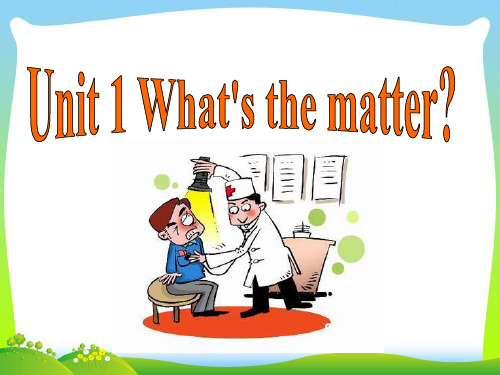
2a Listen and number the pictures
[1-5] in the order you hear them.
2
4
3
1
5
2b Listen again. Match the
problems with the
1 fevaerdvice.
a lie down and rest
2 stomachache
13、He who seize the right moment, is the right man.谁把握机遇,谁就心想事成。2021/7/282021/7/282021/7/282021/7/287/28/2021
14、谁要是自己还没有发展培养和教育好,他就不能发展培养和教育别人。2021年7月28日星期三2021/7/282021/7/282021/7/28
Conversation 5 Betty: What’s the matter, Judy?
Ann: She _h__a_s_a__so_r_e__t_h_r_o_a_t.
1c Look at the picture. What are the students’ problems? Make conversations.
She didn’t take care of herself on the weekend. She was playing with her friends at the park yesterday. Then it got windy, but she didn’t put on her jacket. Now she has a cold.
break
n. 间歇;休息
hurt (hurt) v. (使)疼痛;受伤
人教版新目标初二英语八年级下册Unit 1 What's the matter Section A(1a-2d)PPT课件
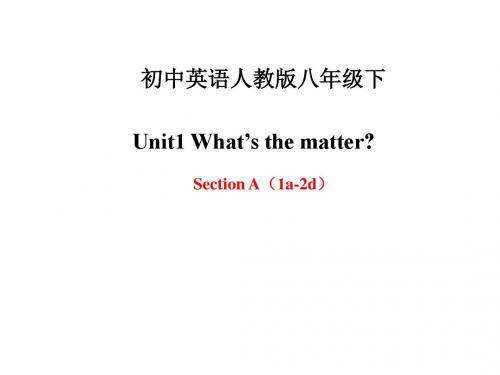
He hurt himself.
She hurt herself.
He has a stomachache.
She has a stomachache.
He has a cough.
She has a cough.
He has a headache.
She has a headache.
Pair Work
2
4
3
1
5
2b
Listen again. Match the problems with the advice.
1.fever
a. lie down and rest
2.sore throat
3.stomachache 4.toothache 5.cut myself
b. drink some hot tea with honey
g ___arm h ___back e ___ear ___eye i
b a ___foot ___hand
l ___leg ___mouth c
j ____head d ____neck
k m f ___nose ___stomach ____tooth
1b
Listen and look at the picture. Then number the names [1-5].
Look and say What’s the matter with him/her…?
He has a toothache. She has a toothache.Biblioteka He has a fever.
She has a fever.
He has a sore throat.
人教版八年级英语下册Unit1_SectionB(2a-2e)名师课件
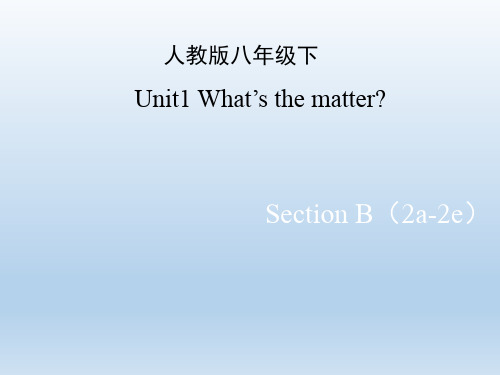
mind taking risks.
__5__ Aron did not give up after the accident
and keeps on cliБайду номын сангаасbing mountains today.
__4__ He wrote a book about his experience. __3__ Aron lost half his right arm from the 2003 accident.
• On the day, Aron’s arm was caught under a 2000-kilo rock that fell on him when he was climbing by himself… After that, he climbed down the mountain to find help.
Accidents or problems
fall down
hurt our back or arm
get sunburned
hit by a ball
cut ourselves
mountain climbing have problems breathing
2a
Accidents or problems can sometimes happen when we do sports. Write the letter of each sport next to
冒险 n. (交通)事故;意外遭遇
Words and expressions
situation kilo rock
run out (of) knife
cut off blood mean get out of
__5__ Aron did not give up after the accident
and keeps on cliБайду номын сангаасbing mountains today.
__4__ He wrote a book about his experience. __3__ Aron lost half his right arm from the 2003 accident.
• On the day, Aron’s arm was caught under a 2000-kilo rock that fell on him when he was climbing by himself… After that, he climbed down the mountain to find help.
Accidents or problems
fall down
hurt our back or arm
get sunburned
hit by a ball
cut ourselves
mountain climbing have problems breathing
2a
Accidents or problems can sometimes happen when we do sports. Write the letter of each sport next to
冒险 n. (交通)事故;意外遭遇
Words and expressions
situation kilo rock
run out (of) knife
cut off blood mean get out of
Units 1---5 复习( 课件)-2024-2025学年人教版英语八年级
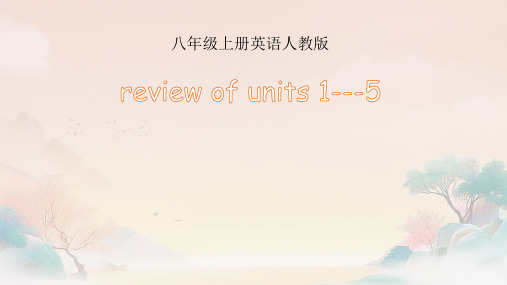
八年级上册英语人教版
Review the words of unit 1
任务一:我指你说
anyone
everyone someone bird
umbrella
anywhere of course diary
bicycle wet
wonderful myself enjoyable building because of
戏院;剧场 (n.) 使人舒服的;舒适的 (adj.) 座位;坐处(如椅子等) (n.) 银幕;屏幕 (n.) (在空间、时间上)接近 (adj.) 票;入场券 (n.)
worst 最差(的);最坏(的);最糟(的) (adj.& adv.) cheaply 便宜地;低廉地 (adv.)
song 歌;歌曲 (n.) choose 选择;挑选 (v.) carefully 细致地;小心地;谨慎地 (adv.) reporter 记者 (n.)
few
yourself activity trader
below
quite a few hen
decide
wonder enough
most
pig
try
difference hungry
something seem
paragliding top
as
noting
bored feel like wait
hill
review the grammar 一、一般过去时
一.概念:表示过去发生的动作,常与过去状语连用。 for example:yesterday, the day before yesterday,last week,three days ago,just now
Review the words of unit 1
任务一:我指你说
anyone
everyone someone bird
umbrella
anywhere of course diary
bicycle wet
wonderful myself enjoyable building because of
戏院;剧场 (n.) 使人舒服的;舒适的 (adj.) 座位;坐处(如椅子等) (n.) 银幕;屏幕 (n.) (在空间、时间上)接近 (adj.) 票;入场券 (n.)
worst 最差(的);最坏(的);最糟(的) (adj.& adv.) cheaply 便宜地;低廉地 (adv.)
song 歌;歌曲 (n.) choose 选择;挑选 (v.) carefully 细致地;小心地;谨慎地 (adv.) reporter 记者 (n.)
few
yourself activity trader
below
quite a few hen
decide
wonder enough
most
pig
try
difference hungry
something seem
paragliding top
as
noting
bored feel like wait
hill
review the grammar 一、一般过去时
一.概念:表示过去发生的动作,常与过去状语连用。 for example:yesterday, the day before yesterday,last week,three days ago,just now
人教版八年级英语下册教学PPT课件Unit1第一课时(Section A 1a-2d)
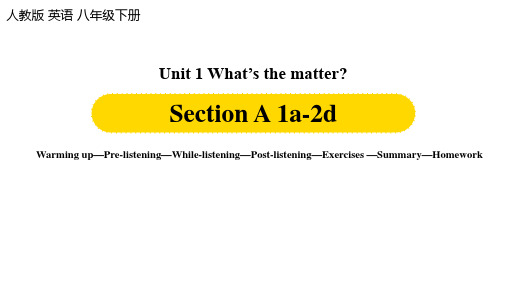
Nancy: has a toothache
Sarah: has a cold
Ben: has a sore back
David: got a stomachache last night
Judy: has a very sore throat
While-listening
Listen again and fill in the blanks.
Nancy____ Sarah ____ David ____ Ben ____ Judy ____
While-listening
1b Listen and look at the picture. Then number the names[1-5].
Nancy___3__ Ben ___5__
This is my... These are my...
Pre-listening
1a Look at the picture. Write the correct letter[a-m] for each part of the body.
__h___ arm __e___ back __g___ ear __i___ eye __b___ foot ___a__ hand __j___ head __l___ leg __c___ mouth ___d__ neck __m___ nose ___k__ stomach __f___ tooth
last night
birthday party.
has a sore back __h_u_r_t __ _h_im__s_el_f_when playing soccer.
Nancy has a toothache
Sarah: has a cold
Ben: has a sore back
David: got a stomachache last night
Judy: has a very sore throat
While-listening
Listen again and fill in the blanks.
Nancy____ Sarah ____ David ____ Ben ____ Judy ____
While-listening
1b Listen and look at the picture. Then number the names[1-5].
Nancy___3__ Ben ___5__
This is my... These are my...
Pre-listening
1a Look at the picture. Write the correct letter[a-m] for each part of the body.
__h___ arm __e___ back __g___ ear __i___ eye __b___ foot ___a__ hand __j___ head __l___ leg __c___ mouth ___d__ neck __m___ nose ___k__ stomach __f___ tooth
last night
birthday party.
has a sore back __h_u_r_t __ _h_im__s_el_f_when playing soccer.
Nancy has a toothache
八年级上册英语Unit1单元课件(人教版)

八年级上册英语
Unit 1教案
Where did you go on vacation?
Section A Period 1 (1a-2d)
Where did you go on vacation?
went to the mountains
Where did you go on vacation?
3a Fill in the blanks with the words in the box and practice the conversation.
Linda: Did you do _a_n_y_th__in_g_ fun on
your vacation, Alice?
anyone
Alice: Yes, I did. I went to Sanya. something
clean play visit study have go
cleaned played visited studied had went
stay
stayed
watch
watched
practice practiced
do
did
am / is was
1b Listen and number the people in the picture [1-5].
Where did you go on vacation?
visited museums
Where did you go on vacation?
went to summer camp
1a Match the activities with the pictures [a-g].
Where did you go
Unit 1教案
Where did you go on vacation?
Section A Period 1 (1a-2d)
Where did you go on vacation?
went to the mountains
Where did you go on vacation?
3a Fill in the blanks with the words in the box and practice the conversation.
Linda: Did you do _a_n_y_th__in_g_ fun on
your vacation, Alice?
anyone
Alice: Yes, I did. I went to Sanya. something
clean play visit study have go
cleaned played visited studied had went
stay
stayed
watch
watched
practice practiced
do
did
am / is was
1b Listen and number the people in the picture [1-5].
Where did you go on vacation?
visited museums
Where did you go on vacation?
went to summer camp
1a Match the activities with the pictures [a-g].
Where did you go
初中英语人教版八年级上册Unit 1 .-阅读课件
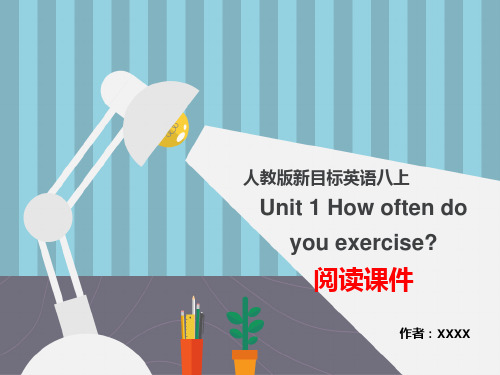
现方式做保护处理对用户上传分享的文档内容本身不做任何修改或编辑并不能对任何下载内容负责
人教版新目标英语八上
Unit 1 How often do you exercise?
阅读课件
作者:XXXX
The good habits of English study
Jane is a 16-year-old high school student in the United States. American Teenager magazine asked her about her habits. Jane has a lot of good habits. She always exercises and she reads day Also, she _______ books every _______. often drinks juice ever and she hardly _______ stays up late. However, she has usually watches TV some bad habits, too. She _______ for more than two hours a day, and she _______ sometimes eats hamburgers. Her parents are not very hardly ever happy because she __________ helps with housework and she never _______ goes to the dentist 水 for teeth cleaning. She says she is afraid.
水
Free talk: Talk about your habits.
人教版新目标英语八上
Unit 1 How often do you exercise?
阅读课件
作者:XXXX
The good habits of English study
Jane is a 16-year-old high school student in the United States. American Teenager magazine asked her about her habits. Jane has a lot of good habits. She always exercises and she reads day Also, she _______ books every _______. often drinks juice ever and she hardly _______ stays up late. However, she has usually watches TV some bad habits, too. She _______ for more than two hours a day, and she _______ sometimes eats hamburgers. Her parents are not very hardly ever happy because she __________ helps with housework and she never _______ goes to the dentist 水 for teeth cleaning. She says she is afraid.
水
Free talk: Talk about your habits.
人教版英语八年级上Unit1整单元课件(共192张)
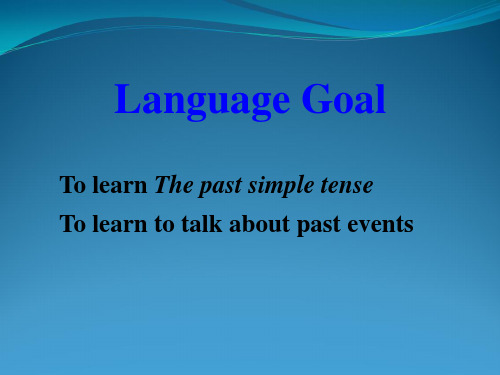
2)如果动词是延续性动词,则一般它即可 表示动作,也可以表示状态。 如:live/stay/work等就是此类。 3)如果是单独的瞬间性动词,则它只表示 动作。 如:get up/put on/begin就属于此类。
5. Did you buy anything special? 在英语中,anything, something, nothing 和everything是用于指代事物的复合不定代 词,与之相对应的复合不定代词 anyone, someone, no one 和everyone ( anybody, somebody, nobody 和 everybody) 用于指人。
happy.
2d Role-play the conversation. Rick: Hi, Helen. Long time no see. Helen: Hi, Rick. Yes, I was on
vacation last month. Rick: Oh, did you go anywhere
4. I was on vacation last month. be on vacation 译为 “在度假” 强调状态。 而 “go to vacation”, 去度假。 强调动作。 我们应该如何区分英语中强调动作和状态 的词语: 1)一般来说,单独的动词/短语一般强调动 作;而如果“be + 分词/形容词”则只表状态 。如marry sb和get married to sb表动作,而 be married to sb表状态。
She visited the USA. She went to New York City.
Where did they go on vacation?
They went to summer camp. /kæmp/
人教版八年级上英语 unit 1单元课件全套

but we didn’t get any fish.
Conversation 3 Boy: Did you go anywhere on vacation, Tom? Tom: I _w__e_n_t_t_o_s_u_m__m_e_r__c_a_m_p__. Boy: Did you go with anyone?
Girl: What did you do on vacation, Sally? Sally: Nothing. I just _s_t_a_y_e_d_a_t__h_o_m_e__. Girl: And did you do anything interesting, Bob? Bob: Yes. I _v_i_si_t_ed__m__y_u_n_c_l_e_. We went fishing,
状元成才路 状元成才路
visited museums
状元成才路 状元成才路
went hiking
stayed at home
状元成才路 状元成summe状r元成才路camp
状元成才路
went to New York City
Vacation activities
went fishing
went camping
状元成才路 状元成才路
状元成才路
played computer
状元成才路
went to the park
went to the
beach
Language Goal:
Talk about past events
—Where did you go on vacation?
Conversation 1
Xiang Hua: Hey, Tina. Where did you _g_o_o_n__v_a_c_a_ti_o_n_? Tina: I _w_e_n_t__to__th__e_m__o_u_n_ta_i_n_s_ with my family.
Conversation 3 Boy: Did you go anywhere on vacation, Tom? Tom: I _w__e_n_t_t_o_s_u_m__m_e_r__c_a_m_p__. Boy: Did you go with anyone?
Girl: What did you do on vacation, Sally? Sally: Nothing. I just _s_t_a_y_e_d_a_t__h_o_m_e__. Girl: And did you do anything interesting, Bob? Bob: Yes. I _v_i_si_t_ed__m__y_u_n_c_l_e_. We went fishing,
状元成才路 状元成才路
visited museums
状元成才路 状元成才路
went hiking
stayed at home
状元成才路 状元成summe状r元成才路camp
状元成才路
went to New York City
Vacation activities
went fishing
went camping
状元成才路 状元成才路
状元成才路
played computer
状元成才路
went to the park
went to the
beach
Language Goal:
Talk about past events
—Where did you go on vacation?
Conversation 1
Xiang Hua: Hey, Tina. Where did you _g_o_o_n__v_a_c_a_ti_o_n_? Tina: I _w_e_n_t__to__th__e_m__o_u_n_ta_i_n_s_ with my family.
新目标八年级上Unit1 单元主题思维导图课件 (新人教版八年级上册英语ppt)(共6张PPT)
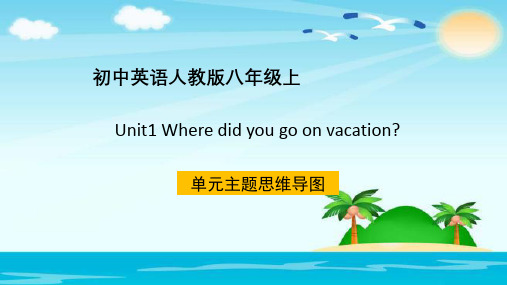
指人 (以-body和 -one结尾)
someone (某人) everyone (每个人)
anyone (任何人)
no one (没有人)
somebody (某人)
1.一般来说,由some 构成的不定代词往往用于肯定句中, any构成 的用于否定句和疑问句中。(在表请求、期 望得到对方肯定回答的疑问句中, 用由some 构成的复合不定代词。
复
everybody (每个人)
合 不 定
anybody (任何人)
用 2. 作主语时,谓语动词必须用单数形式。 法
代 词
nobody (没有人)
everything (一切事物)
3. 被形容词修饰时,形容词要后置,作后置定语。
指物 (以-thing结尾)
anything (任何事物) something (某事物)
stayed at home, visited my uncle, visited museums, went to N.Y.City/summer camp/ the mountains/the beach, ate sth. delicious, did sth. special...
delicious, exciting, terrible, expensive, cheap, boring, bored, wonderful, great, enjoyable, interesting, special, excellent, old, new, good, bad, wet…
v.+ed v.+d y变i+ed 双写辅音
字母+ed
worked liked cried played lived flied
部编人教版八年级英语上册《【全册】第1至5单元》精品PPT优质课件

He went to New York City.
Where did he go on vacation?
He went to the beach.
Language points
1. — Where did you go on vacation? — I went to the mountains.
Xiang Hua: _I_w__en__t _to__N_e_w__Y_o_r_k__C_i_t_y_.
Conversation 2
Girl: What did you do on vacation, Sally? Sally: Nothing. I just _s_t_a_y_e_d_a_t__h_o_m_e__. Girl: And did you do anything interesting, Bob? Bob: Yes. I _v_i_si_t_ed__m__y_u_n_c_l_e_. We went fishing,
Xiang Hua: Hey, Tina. Where did you _g_o_o_n__v_a_c_a_ti_o_n_? Tina: I _w_e_n_t__to__th__e_m__o_u_n_ta_i_n_s_ with my family.
Xiang Hua: Did everyone have a good time? Tina: Oh, yes. Everything was excellent. Where did you go, Xiang Hua?
拜访我的叔叔 照相 上个月 黄果树瀑布 去度假
Lead-in
What did you do on summer vacation?
visited museums
Unit 1 单元知识点总结课件--八年级英语下册(人教版)

I can look after myself.
02 作表语
描述身体/精神状态或感觉
常放be, feel, seem, look…后
You can be yourself.
03 作同位语
强调作用, 常作主语或宾语 的同位语, 表示“亲自,本人” The story itself is good. .
02
(die- died- died- dying)
She died 2 years ago.
04 dying adj. 垂死的,要死的
This is a dying bird.
2.7 risk
n. 危险,风险
the risk of … …的风险 Staying up will increase the risk of the illness.
lie down and rest / shouldn’t eat so much next time
④ have a toothache
see a dentist and get an X-ray
⑤ have a fever
take one’s temperature
⑥ have a headache
Words
matter, lie, enough, mean…
2.1 matter
n. 问题,事情
-- What’s the matter with you? -- I hurt my leg.
v. 要紧,有关系
It doesn’t matter.
2.2 enough
位置:前形副后
adj. 足够的,充足的 enough + n I have enough money.
02 作表语
描述身体/精神状态或感觉
常放be, feel, seem, look…后
You can be yourself.
03 作同位语
强调作用, 常作主语或宾语 的同位语, 表示“亲自,本人” The story itself is good. .
02
(die- died- died- dying)
She died 2 years ago.
04 dying adj. 垂死的,要死的
This is a dying bird.
2.7 risk
n. 危险,风险
the risk of … …的风险 Staying up will increase the risk of the illness.
lie down and rest / shouldn’t eat so much next time
④ have a toothache
see a dentist and get an X-ray
⑤ have a fever
take one’s temperature
⑥ have a headache
Words
matter, lie, enough, mean…
2.1 matter
n. 问题,事情
-- What’s the matter with you? -- I hurt my leg.
v. 要紧,有关系
It doesn’t matter.
2.2 enough
位置:前形副后
adj. 足够的,充足的 enough + n I have enough money.
人教版新目标英语八年级上册 Unit1 - 2 复习课件(共28张PPT)
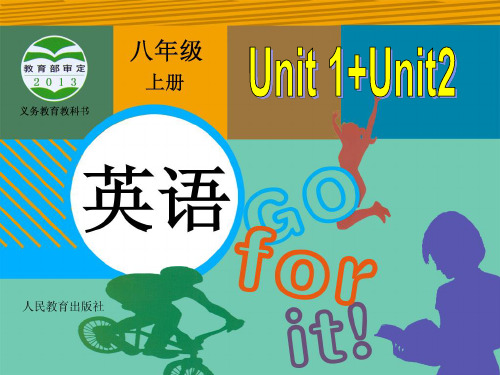
八年级 U1+U2复习
课前请准备好: 1.八上课本 2.升学锦囊 3.听写本
(按上学期的要求准备)
4.黑笔、红笔、荧光笔
一、重点单词(课本p121-p123) 二、基础知识(课本p1-p16)
复习流程
三、高频考点聚焦(锦囊p27-29) 四、当堂检测(锦囊p29+p169)
一、重点单词(课本p121-p123)
_______a difference a day makes! They wanted to walk up to the top, but it started raining so they decided to take the train. When they got to the top, it was raining really_______(猛烈地). We didn’t have an umbrella so we were wet and cold. Because _____the bad weather, we couldn’t see _________(任何东西)below. We had one bowl of rice and some fish. The food tasted ________(great) because I was so hungry.
要求:暂停播放,自己复习U1-2单词,3min后听写。 1.AB层:注意单词的意思、词性、固定搭配等。 2.C层:只背黑色标注单词及词组
听写内容(c层写基本单词即可)
1.任何人 2.每人;所有人 3.一件令人愉悦的事 4.决定做某事 5.给…的感觉
6.wonder 7.差别,差异 8.一把伞
9.hardly 10.节目
▲语法-不定代词
课前请准备好: 1.八上课本 2.升学锦囊 3.听写本
(按上学期的要求准备)
4.黑笔、红笔、荧光笔
一、重点单词(课本p121-p123) 二、基础知识(课本p1-p16)
复习流程
三、高频考点聚焦(锦囊p27-29) 四、当堂检测(锦囊p29+p169)
一、重点单词(课本p121-p123)
_______a difference a day makes! They wanted to walk up to the top, but it started raining so they decided to take the train. When they got to the top, it was raining really_______(猛烈地). We didn’t have an umbrella so we were wet and cold. Because _____the bad weather, we couldn’t see _________(任何东西)below. We had one bowl of rice and some fish. The food tasted ________(great) because I was so hungry.
要求:暂停播放,自己复习U1-2单词,3min后听写。 1.AB层:注意单词的意思、词性、固定搭配等。 2.C层:只背黑色标注单词及词组
听写内容(c层写基本单词即可)
1.任何人 2.每人;所有人 3.一件令人愉悦的事 4.决定做某事 5.给…的感觉
6.wonder 7.差别,差异 8.一把伞
9.hardly 10.节目
▲语法-不定代词
人教版英语八年级下册Unit1Section B1a_1d课件

stop bleeding.
Pre-Listening
— _W__h_a_t_’s_t_h_e__m_a_t_t_e_r_? — The boy _c_u_t_h_i_s_f_in_g_e_r_. — Does he take good care of himself? — _N_o_,_h_e__d_o_e_s_n_’t_. He should put
√
Someone
cut his knee. √
Someone hurt his back.
Someone had a fever.
Someone got hit on the head.
√
Treatments
Pre-Listening
1c
Listen again. Write the letter of each treatment next to the problems you checked in the chart above.
Pre-Listening
_F_i_r_s_t Go to the hospital. N_e_x_t__ Get an X-ray. T_h_e_n__ Rest for a few days.
Pre-Listening
_N_e_x_t_ Put a bandage on it. _F_i_rs_t_ Run it under water. _T_h_e_n_ Put some medicine on it.
— _Y_e_s_,_h_e__sh_o_u__ld__.
Pre-Listening
—_W__h_a_t’_s_t_h_e_m__a_t_te_r__(w__it_h__h_e_r)_? —The girl has a nosebleed. —_W__h_a_t_s_h_o_u_ld__s_h_e_d_o__? —_S_h_e_s_h_o_u_l_d_ put her head down to
Pre-Listening
— _W__h_a_t_’s_t_h_e__m_a_t_t_e_r_? — The boy _c_u_t_h_i_s_f_in_g_e_r_. — Does he take good care of himself? — _N_o_,_h_e__d_o_e_s_n_’t_. He should put
√
Someone
cut his knee. √
Someone hurt his back.
Someone had a fever.
Someone got hit on the head.
√
Treatments
Pre-Listening
1c
Listen again. Write the letter of each treatment next to the problems you checked in the chart above.
Pre-Listening
_F_i_r_s_t Go to the hospital. N_e_x_t__ Get an X-ray. T_h_e_n__ Rest for a few days.
Pre-Listening
_N_e_x_t_ Put a bandage on it. _F_i_rs_t_ Run it under water. _T_h_e_n_ Put some medicine on it.
— _Y_e_s_,_h_e__sh_o_u__ld__.
Pre-Listening
—_W__h_a_t’_s_t_h_e_m__a_t_te_r__(w__it_h__h_e_r)_? —The girl has a nosebleed. —_W__h_a_t_s_h_o_u_ld__s_h_e_d_o__? —_S_h_e_s_h_o_u_l_d_ put her head down to
人教版初中英语八年级英语下册全单元ppt课件Unit1完整版
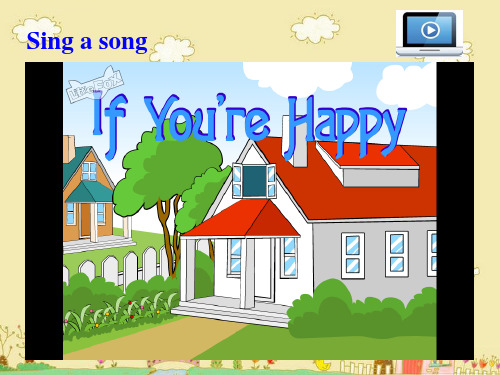
He has a toothache. She has a fever.
本标准适用于已投入商业运行的火力 发电厂 纯凝式 汽轮发 电机组 和供热 汽轮发 电机组 的技术 经济指 标的统 计和评 价。燃 机机组 、余热 锅炉以 及联合 循环机 组可参 照本标 准执行 ,并增 补指标 。
She has a cough.
4.toothache
d. take your temperature
5.cut myself
e. put some medicine on it
1- d 2- a 3- b 4- c 5- e
本标准适用于已投入商业运行的火力 发电厂 纯凝式 汽轮发 电机组 和供热 汽轮发 电机组 的技术 经济指 标的统 计和评 价。燃 机机组 、余热 锅炉以 及联合 循环机 组可参 照本标 准执行 ,并增 补指标 。
本标准适用于已投入商业运行的火力 发电厂 纯凝式 汽轮发 电机组 和供热 汽轮发 电机组 的技术 经济指 标的统 计和评 价。燃 机机组 、余热 锅炉以 及联合 循环机 组可参 照本标 准执行 ,并增 补指标 。
Work in Pairs
A: What’s the matter with…? B: He/She has a …
2a. Listen and number the pictures [1-5] in the order you hear them.
2
4
3
1
5
本标准适用于已投入商业运行的火力 发电厂 纯凝式 汽轮发 电机组 和供热 汽轮发 电机组 的技术 经济指 标的统 计和评 价。燃 机机组 、余热 锅炉以 及联合 循环机 组可参 照本标 准执行 ,并增 补指标 。
Listen again. Then fill in the blanks.
本标准适用于已投入商业运行的火力 发电厂 纯凝式 汽轮发 电机组 和供热 汽轮发 电机组 的技术 经济指 标的统 计和评 价。燃 机机组 、余热 锅炉以 及联合 循环机 组可参 照本标 准执行 ,并增 补指标 。
She has a cough.
4.toothache
d. take your temperature
5.cut myself
e. put some medicine on it
1- d 2- a 3- b 4- c 5- e
本标准适用于已投入商业运行的火力 发电厂 纯凝式 汽轮发 电机组 和供热 汽轮发 电机组 的技术 经济指 标的统 计和评 价。燃 机机组 、余热 锅炉以 及联合 循环机 组可参 照本标 准执行 ,并增 补指标 。
本标准适用于已投入商业运行的火力 发电厂 纯凝式 汽轮发 电机组 和供热 汽轮发 电机组 的技术 经济指 标的统 计和评 价。燃 机机组 、余热 锅炉以 及联合 循环机 组可参 照本标 准执行 ,并增 补指标 。
Work in Pairs
A: What’s the matter with…? B: He/She has a …
2a. Listen and number the pictures [1-5] in the order you hear them.
2
4
3
1
5
本标准适用于已投入商业运行的火力 发电厂 纯凝式 汽轮发 电机组 和供热 汽轮发 电机组 的技术 经济指 标的统 计和评 价。燃 机机组 、余热 锅炉以 及联合 循环机 组可参 照本标 准执行 ,并增 补指标 。
Listen again. Then fill in the blanks.
(人教版)初中八年级英语下册Unit 1 书面表达(写作课优质课)专题讲解教学课件
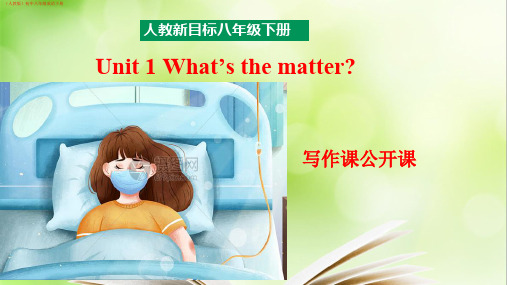
参照此文, 修改自己的作文。
and take some medicine, and it’s important for you to drink more hot water. You must wear warm
clothes and You'd better not go to school. Going
Doing sth. is ________ for you.
The sentences should try to be various (句式要多样化)
(人教版)初中八年级英语下册
话题小作文
I hear you have a cold these days.
I think it's best for you to go to see the doctor
1. 感冒 have a cold 2. 发烧 have a fever 3. 咳嗽 have a cough 4. 牙疼 have a toothache 5. 胃疼 have a stomachache 6. 头疼 have a headache 7. 背疼 have a sore back\backache 8. 喉咙疼 have a sore throat
(人教版)初中八年级英语下册
Imagine you are the school nurse and a student just had 3a an accident or a health problem. Make notes about what
he/she should and shouldn’t do.
What’s the matter?/ What happened?/ Are you OK? No, I don’t feel well./ I feel…/ I have a …/ Should I…? You should…/ You shouldn’t… fell down/ got hit by…/ cut myself / hurt my…
人教版英语八年级上册 Unit1 Section A 经典高清课件
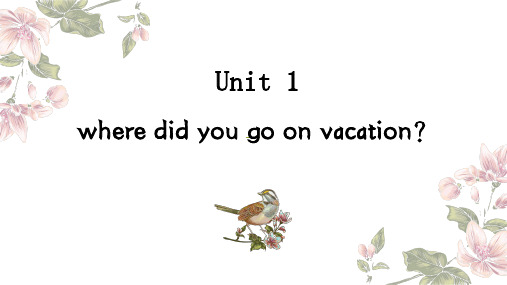
[ˈsʌmwʌn] pron.某人 例句:Someone looked at the map.
diary 英[ˈdaɪəri] n.日记; 日记簿;
例句:Did you keep a diary? 你有没有坚持写日记的习惯?
根据句意和提示写出所缺单词 1. The sofa is terribly heavy. Can you move it by yourself ?
Section A 课文 Can you anwser? 1. Did Helen go anywhere interesting? Helen 有没有去比较有意思的地方呢? 2. Did reck do anything special? Rick有没有做一些特殊的事情呢?
Yes, she did. She went to Guizhou with my family. Not really. I just stayed at home most of the time to
yourself
[jɔːrˈself] yourselves 英[jɔːˈsɛlvz] pron.你自己; (用以加强语气) pron.(反身代词)你自己; 您自己; 例句:Why didn't you buy something for you ?
为什么你没给你自己买一些东西呢? 注意:英文里面你是yourself,复数形式你们 yourselves.是变f为v加es,同时注意读音。
Did you see Huangguoshu Waterfall?
Helen: Yes, I did. What about you? (3) B
Rick: Not really. I just stayed at home most of the time to read and relax.
diary 英[ˈdaɪəri] n.日记; 日记簿;
例句:Did you keep a diary? 你有没有坚持写日记的习惯?
根据句意和提示写出所缺单词 1. The sofa is terribly heavy. Can you move it by yourself ?
Section A 课文 Can you anwser? 1. Did Helen go anywhere interesting? Helen 有没有去比较有意思的地方呢? 2. Did reck do anything special? Rick有没有做一些特殊的事情呢?
Yes, she did. She went to Guizhou with my family. Not really. I just stayed at home most of the time to
yourself
[jɔːrˈself] yourselves 英[jɔːˈsɛlvz] pron.你自己; (用以加强语气) pron.(反身代词)你自己; 您自己; 例句:Why didn't you buy something for you ?
为什么你没给你自己买一些东西呢? 注意:英文里面你是yourself,复数形式你们 yourselves.是变f为v加es,同时注意读音。
Did you see Huangguoshu Waterfall?
Helen: Yes, I did. What about you? (3) B
Rick: Not really. I just stayed at home most of the time to read and relax.
人教版八年级英语上册-第一单元-unit1-Section A (GF-3c) 教学课件
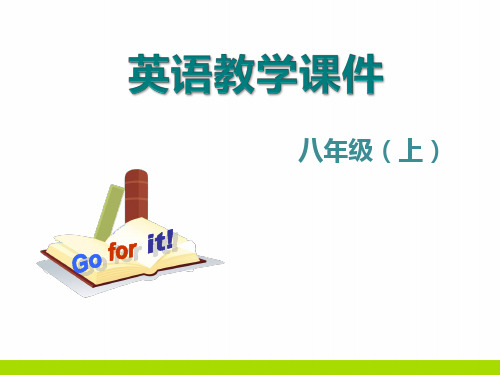
_E_v_e_r_y_t_h_in_g__ was great. We fed some hens and saw some baby pigs. They were so cute! The only problem was that there was _n_o_t_h_in_g_ much to do in the evening but read. Still _n_o__o_n_e_ seemed to be bored. Bye for now! Mark
八年级(上)
Unit 1
Where did you go on vacation?
Section A (Grammar Focus-3c)
学习目标
Key words & phrases:
something,nothing,everyone,myself, yourself,someone,seem,bored,diary go out,have a good time,of course,keep a diary
A: Are there any apples in the fridge? B: Yes, there are some.
/ No, there aren’t any. A: Is there any water in the bottle? B: Yes, there is some water.
某物
(指两个以上)
other(s) 另一个 (些)
another 另外一 个;又一个
much 很多 many 很多
neither 没人或物
(指两个当中)
anybody 任何 either 任何一个
人
(指两个当中)
人教版英语八年级下册Unit1 Section B 1a-1d 课件(共14张ppt)

Listen to the school nurse.
1b Check (√) the problems
you hear.Pro源自lemsTreatments Problems
Treatments
Someone
b, c
felt sick. √
Someone
cut his knee. √
Someone had a nosebleed.
_2____ Press the sides of your nose. _1___ Put your head down. _3___ Clean your face.
__1___ Go to the hospital. __2___ Get an X-ray. __3___ Rest for a few days.
2.Master the important phrases: put a bandage on it, run it under water,
have a nosebleed, get hit on the head, put her head down, what happened, tell sb. not to do sth.
Practice
1. --- Sam was so careless that he hurt __C____ on the broken glass.
A. myself
B. herself
C. himself
2. It’s cold outside. You’d better __A___ your coat.
1a
When these accidents happen, what should you do? Put the actions in order.
- 1、下载文档前请自行甄别文档内容的完整性,平台不提供额外的编辑、内容补充、找答案等附加服务。
- 2、"仅部分预览"的文档,不可在线预览部分如存在完整性等问题,可反馈申请退款(可完整预览的文档不适用该条件!)。
- 3、如文档侵犯您的权益,请联系客服反馈,我们会尽快为您处理(人工客服工作时间:9:00-18:30)。
缩略形式:’ll
will 常用于第二、三人称, 但在口语中各种人 称都可以用will。 will
否定式:will not = won’t
时态:一般将来时
The Simple Future Tense
4、基本句型:
肯定句:
主语 + shall / will +v.原形
否定句:
主语 + shall / will +not + v.原形
next week 下周
next month 下个月
next year 明天
before 不久
soon 不久
the day after tomorrow 后天
the year after next 后年
the week after next 下下周
时态:一般将来时 The Simple Future Tense
Will people have robots in their homes?
A: Do you think there will be robots in people’s homes? B: Yes, there will. I think every home will have a robot. A: Will kids go to school? B: No, kids won’t go to school. They will study at home on computers. …
2a Listen and circle the words you hear.
1. There will be more/less/fewer people. 2. There will be more/less/fewer free time. 3. There will be more/less/fewer cars. 4. There will be more/less/fewer pollution. 5. There will be more/less/fewer trees.
④ You ought to smoke _f_e_w__e_r cigarettes and drink _l_e_s_s_ beer .
2b Listen again. Check the predictions you hear.
_____ 1. There will be fewer people. _____ 2. There will be less free time. _____ 3. People will use the subways less. _____ 4. There will be more pollution. _____ 5. Cities will be very big and crowded.
2c Group work
Change the predictions into questions and ask each other these questions.
A: I think there will be fewer people. B: Well, I don’t agree. But I think there will be
What will you be in 10 years? I’ll be an engineer.
What will you be in 10 years? I’ll be a teacher.
What will you be in 10 years? I’ll be an actor.
A:What will you be in 10 years? B:I will be a …. A:Where will you work? B:I will work in ….
6、练习翻译:
⑴ 明天,Jim就15岁了。 Jim will be fifteen years old tomorrow. ⑵明天我爷爷不会去钓鱼。
My grandfather won’t go fishing tomorrow. ⑶你下个月将会来合肥吗?
Will you come to Hefei next month? ⑷我们什么时候再见面? When shall we meet again?
Make dialogues of 1a.
1b Listen and circle the predictions you hear
in activity 1a.
___A___D 1.People will have robots in their homes. ___A___D 2.People won’t use money. Everything will be free. ___A___D 3.Books will only be on computer, not on paper. ___A___D 4.Kids won’t go to school. They’ll study at home on
一般疑问句: shall / will +主语 + v原形
特殊疑问句: 特殊疑问词 + 一般疑问句
简略回答:
Yes, I shall. / Yes, I will. No, I shan’t. / No, I won’t.
时态:一般将来时
The Simple Future Tense
5、特色词:
tomorrow 明天
试做以下试题:
① I earn __l_e_s_s_ money than my sister. ② There are _f_e_w__e_r cars parking outside today than yesterday.
③ We have _f_e_w__e_r students this year than last year.
coffee
few
fewer更少的(修饰可数名词)(fewest最少的)
一些(否定)
cars, trees, buildings, people, computers, astronauts, robots, times (次数)
fewer & less
相同点: 这两个词后都是比较级, 均可表示“较少的”。 不同点: ⒈ fewer是few的比较级, 只能修饰可数名词的复数。 ⒉ less是little的比较级, 只能修饰不可数名词的复数。
more people. A: I a talking about the earth in the future, in 100 years.
Tom: Will there be more people? Mary: No, there won’t. There will be fewer people. Tom: Will there be more pollution? Mary: No, there won’t. There will be less pollution, because there will be more trees.
What do you think he / she will be in five years?
What sport will he / she play?
What will he / she have?
I think he / she will be
.
3a Look at the pictures of Sally. Then fill in the blanks in the sentences.
Talk about it with your partner.
时态:一般将来时
The Simple Future Tense
1、概念: ⑴表示将要发生的动作或存在的状态。
我们明天去看他。 We shall go to see him tomorrow. ⑵表示将来经常或反复发生的动作。 从现在起我将每天来。
What will you be in 10 years? I’ll be a computer programmer.
What will you be in 10 years? I’ll be a basketball player.
What will you be in 10 years? I’ll be an airline pilot.
From now on I shall come every day.
2、结构: 助动词 shall / will + v.原形
时态:一般将来时
The Simple Future Tense
3、 shall与will的区别:
shall
shall常用于第一人称。 否定式:shall not = shan’t
What can you see in this picture?
There will be… 将会有……
There will be more people. There will be fewer trees. There will be more pollution. There will be more buildings. There will be more cars. There will be less fresh air.
1. Five years ago, Sally was__in__h_i_g_h_s_c_h_o_o_l___. 2. She played_s_o_c_c_e_r__. 3. She had__a__c_a_t __.
4. Today, Sally is___i_n_c_o_l_le_g_e___. 5. She plays_t_h_e__g_u_it_a_r____. 6. She has___a_d__o_g__.
